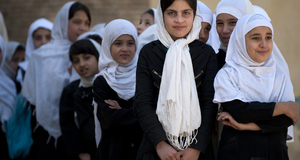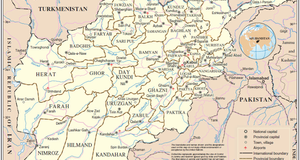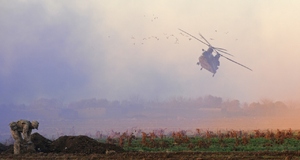Featured Article:Can the U.S. Win the War in Afghanistan?
By
2009, Vol. 1 No. 10 | pg. 2/2 | « Moral ConsiderationsFor all of the real challenges that exist in the Afghanistan-Pakistan conflict, there are also imperative moral questions one must address. Having already examined and determined the primary goals of the United States, the first question to ask may be, “are these goals legitimate?” To answer that question, one must look to the root cause of the war, which was clearly the September 11th, 2001 terrorist attack. In fact, in his article discussing Just War Theory, Brian Orend used 9/11 and the resulting attacks in Afghanistan by U.S. military forces as an example of a legitimate response: “On 9/11, the al-Qaeda terrorist group clearly used armed force, both to gain control of the planes and then again when using the planes as missiles against the targets… This use of armed force was in violation of America's state rights to political sovereignty and territorial integrity, and to all those people's human rights to life and liberty. The terrorist strikes on 9/11 were aggression... As such, they justified the responding attack on the Taliban regime in Afghanistan.”23 It is therefore uncontroversial to conclude that the U.S. response to the 9/11 terrorist attacks was legitimate and justified. Now that we are almost eight years into the war, it seems reasonable to ask, “is the war still justified?” and hence, “are these goals still legitimate?” The underlying premise for our goals in the war are, as President Obama recently emphasized, to prevent another attack on American soil. If one is to answer “yes” to the question of whether or not our goals are still legitimate, an assumption must be made that—if we were to reach our goals—we would in fact be preventing a future harm, and therefore, definitively safer. Otherwise, if one disagrees with that assumption, the effort in Afghanistan may be viewed as an act of revenge or an attempt to gain power, and therefore, illegitimate and immoral.24Most available evidence suggests that the former assumption is most likely: that by securing our goals in Afghanistan, we would in fact be making the U.S. (and other locations) definitively safer. This assumption is nevertheless not universal, and by its nature impossible to prove. A final and related issue, which is not insignificant, questions the ability of military means to defeat—or sufficiently overcome—a threat rooted in ideology. Cindy Combs, in “Terrorism in the 21st Century,” describes most modern day terrorists as “Crusaders” working for a “higher cause:”25 “Religious zealots committing acts of terrorism are assured by their religious leaders that their acts are acceptable to a higher morality… [They] are assured of immortality and a suitable reward if they should die in the commission of the act of terrorism… It would be difficult if not impossible to persuade such persons out of their beliefs… What reward can compete with the promise of immortality?”26 This idea suggests, from a strategic standpoint, that any military strategy would have to be coupled with widespread social reform and dialogue if one hoped to truly minimize the risk of a terrorist attack. These moral considerations are central to a discussion of whether or not the U.S. can be successful in Afghanistan. The ability to reach our goals makes up part of the equation for success, and the ability to do so in a justified, legitimate, and moral way will truly determine if, in the end, we are “successful.” Analysis & Prospects for SuccessBy taking a critical look at how this conflict has reached the point where it is today, it seems clear that our methods have suffered from an unclear long-term strategy and a failure to effectively engage either the local population or the domestic government in a way that promotes a durable peace. The effort has been underfunded, both from a military and economic standpoint, but also from an intellectual and political standpoint. It seems unlikely that the U.S. would be able to achieve its minimum goals if the current effort continues without undergoing significant changes. However, under the leadership of a new President, it is clear that the United States does in fact intend to take a new approach to the region, not just in terms of military strategy but also in terms of political relations. Whether or not we reach our goals will not depend on our capabilities; rather, it will depend on how President Obama decides to implement his new strategy, and on precisely what that strategy entails. Obama has made a clear commitment to revert our focus from Iraq back to Afghanistan, where it began. He has ordered the deployment of more troops, more resources, and more dialogue aimed at securing the region. These are all elements that are needed, and would be vital to any successful outcome. The outcome will also depend on Obama’s ability to create meaningful partnerships with Afghanistan and Pakistan. The relationship over the past eight years has been inefficient and often strained. Nevertheless, both President Karzai and President Zardari reacted positively to Obama’s recent declaration of a new regional strategy,27 and evidence suggests Obama will be more effective at establishing positive international relationships than his predecessor. Many challenges still exist which must be overcome if the U.S. is to reach its goals and be successful in Afghanistan. The United States is nevertheless at a turning point; by refocusing and reorganizing our strategy, as is happening now, it is entirely feasible that we will realize a long fought success in the coming years. Endnotes1.) Katzman, Kenneth. Afghanistan: Post-Taliban Governance, Security, and U.S. Policy. Report no. RL30588. Congressional Research Service, 2009: 2. 2.) Cordesman, Anthony H., and Arleigh A. Burke. Winning in Afghanistan: Creating Effective Afghan Security Forces. Center for Strategic and International Studies, 2009: iii. 3.) "The World Factbook - Afghanistan." 19 Mar. 2009. Central Intelligence Agency. 23 Mar. 2009. 4.) "Afghanistan." U.S. Department of State. 2009.. 25 Mar. 2009 . 5.) U.S. Department of Defense. Report on Progress toward Security and Stability in Afghanistan. 2009. 6.) Gates, Robert M. "Secretary Gates On Afghanistan Mission, Iraq Exit." Interview with National Public Radio. All Things Considered. NPR. 10 Mar. 2009. 7.) Ackerman, Spencer. "Gates: Afghans, Not Just U.S. Troops, Needed to Win War." The Washington Independent 27 Jan. 2009. 8.) Pres. Barack Obama. "A New Strategy for Afghanistan and Pakistan." 27 Mar. 2009. The New York Times. 9.) Cordesman, Anthony H., and Arleigh A. Burke. Winning in Afghanistan: Creating Effective Afghan Security Forces. Center for Strategic and International Studies, 2009: ii-iii. 10.) "2008 marks deadliest year for U.S. troops in Afghanistan." CNN 11 Sept. 2008. 11.) Filkins, Dexter. "Afghan Civilian Deaths Rose 40 Percent in 2008." The New York Times 17 Feb. 2009. 12.) Cordesman, Anthony H., and Arleigh A. Burke. Winning in Afghanistan: Creating Effective Afghan Security Forces. Center for Strategic and International Studies, 2009: 1. 13.) Ibid, 26. 14.) Drew, Christopher. "Drones Are Weapons of Choice in Fighting Qaeda." The New York Times 16 Mar. 2009. 15.) Pres. Barack Obama. "A New Strategy for Afghanistan and Pakistan." 27 Mar. 2009. The New York Times. 16.) Dobbins, James. Counterinsurgency in Afghanistan. Rep. no. CT-318. RAND Corporation, 2009: 1. 17.) "US rethinks Afghanistan strategy." BBC News 27 Mar. 2009. 18.) Sieff, Martin. "Obama takes war to Afghanistan, Pakistan." United Press International 27 Mar. 2009. 19.) Ignatius, David. "A New Dawn in Pakistan." The Washington Post 27 Mar. 2009. 20.) Katzman, Kenneth. Afghanistan: Post-Taliban Governance, Security, and U.S. Policy. Rep. no. ???? RL30588. Congressional Research Service, 2009: 12. 21.) Snow, Donald. National Security for a New Era (3rd Edition). New York: Longman, 2008: 373-375. 22.) Pres. Barack Obama. "A New Strategy for Afghanistan and Pakistan." 27 Mar. 2009. The New York Times. 23.) Orend, Brian. "War." Stanford Encyclopedia of Philosophy. 28 July 2005. Stanford University. 29 Mar. 2009. 24.) Ibid 25.) Combs, Cindy C. Terrorism in the Twenty-First Century (5th Edition). New York: Longman, 2009: 48. 26.) Ibid, 59. 27.) Perlez, Jane. " Pakistan’s President Praises Obama and Offers New Concession to the Opposition." The New York Times 28 Mar. 2009. Suggested Reading from Inquiries Journal
Inquiries Journal provides undergraduate and graduate students around the world a platform for the wide dissemination of academic work over a range of core disciplines. Representing the work of students from hundreds of institutions around the globe, Inquiries Journal's large database of academic articles is completely free. Learn more | Blog | Submit Latest in International Affairs |


















